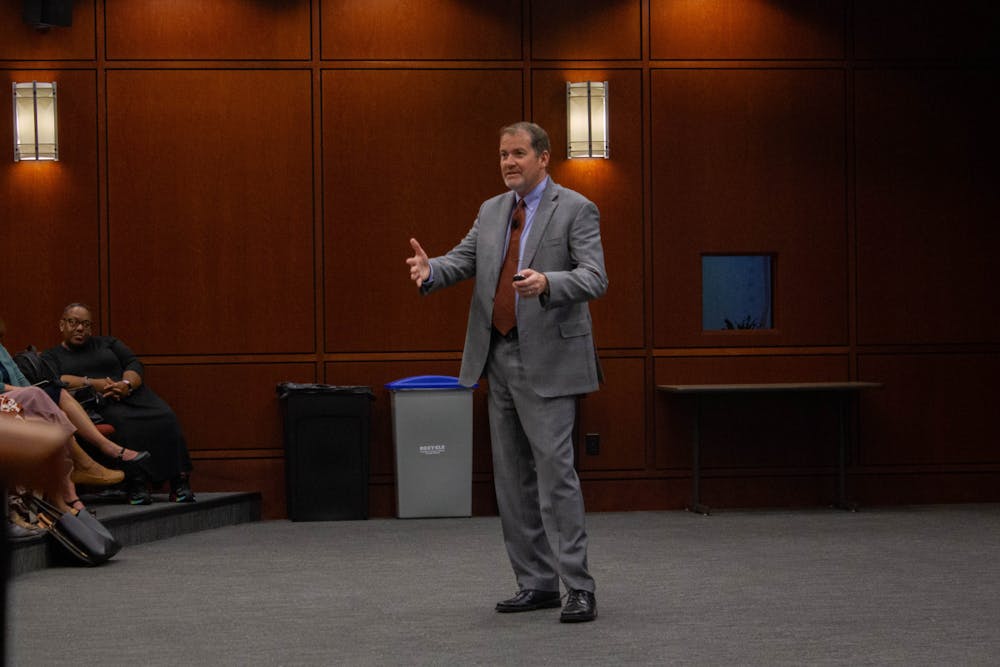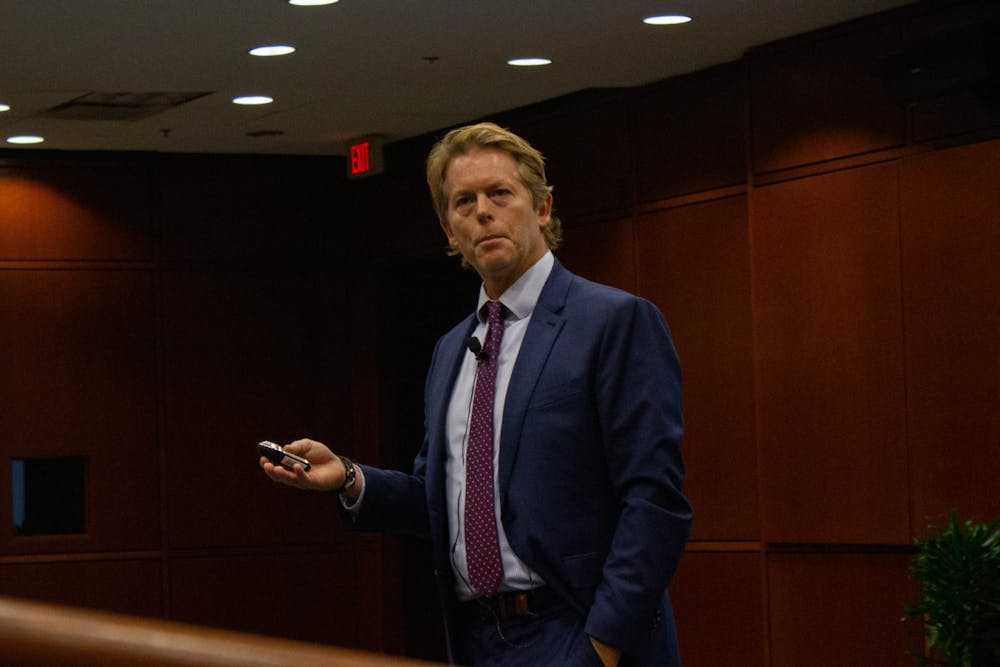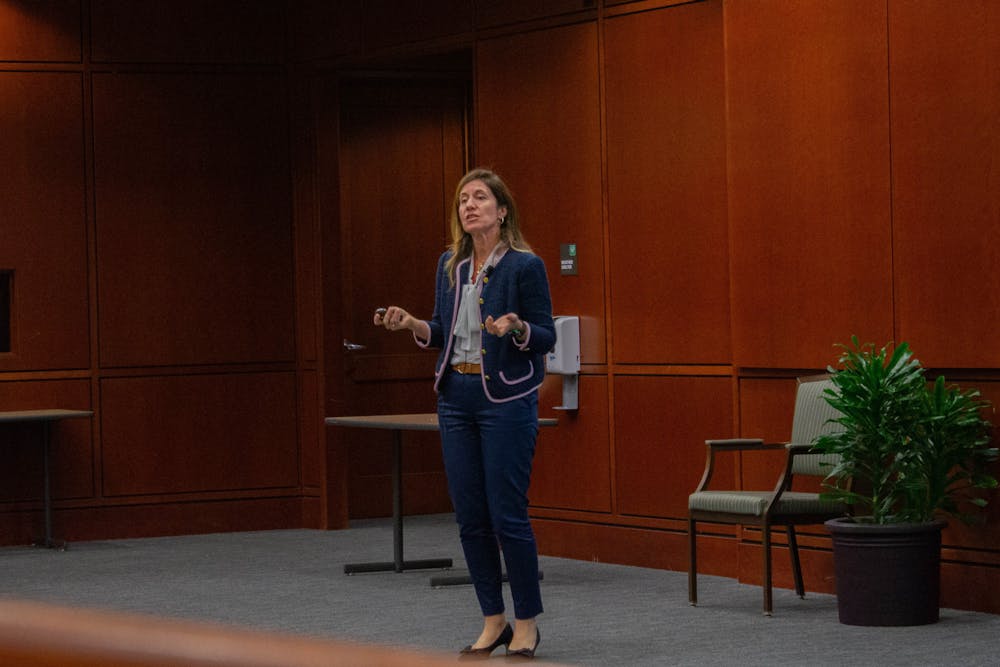Bussiness
Martha and Spencer Love School of Business dean candidates present to faculty, staff

Since the former dean of the Martha and Spencer Love School of Business, Raghu Tadepalli, announced his retirement in April 2024, a search committee has evaluated a pool of applicants and identified four final dean candidates.
They were each hosted on campus in late October and early November to tour classes and present to Love School of Business faculty and staff. The presentation involved a 40-minute response to a prompt on how to respond to the demands of changing perceptions of the value of higher education and the increasing needs for both social responsibility and workforce readiness.
Love School of Business Associate Dean and professor of management information systems Haya Ajjan presented her goals and qualifications Oct. 28. Ajjan grew up in Damascus, Syria, but has lived in North Carolina since moving to America for college.
“I still remember how I felt liberated. I felt like my mind, my heart was liberated, and I was able to find my own voice through higher education,” Ajjan said during the event. “Because of that, I’m a big believer in the power of higher education and changing minds and building communities that are prosperous and that are inclusive.”
Ajjan has initiated and assisted with numerous programs both in the LSB and across Elon since joining the faculty in 2016. She helped launch the Center for Organizational Analytics in 2016, a hub that works collaboratively with the School of Communications, Department of Mathematics and Statistics and the Department of Computing Sciences. She also organized the establishment of Elon Next in 2019, a continuing education and professional development program for staff, alumni and community members.
Associate Dean and Professor of the Love School of Business Haya Ajjan presents her profile in LaRose Digital Theatre, Koury Business Center on Oct. 28.
As dean, Ajjan said she hopes to maintain the culture of Elon and the LSB while navigating a changing higher education landscape. She said she views the role of the dean as a leader who works collaboratively to shape the LSB vision with faculty, staff, students, alumni and community; fosters opportunities that empower students to thrive and succeed; and advocates for and secures resources, empowering faculty and staff to continue their work.
“We need to be making sure that our culture is strong, our faculty are valued and inspired and equipped not only to grow professionally but personally,” Ajjan said. “We need our students to gain a strong education in the liberal arts and in the business education so they’re well prepared for the future.”
This understanding was a key takeaway for Senior Vice President for University Advancement and External Affairs Jim Piatt.
“I think Dr. Ajjan has a great hold, because she’s an internal candidate, on the culture of Elon,” Piatt told Elon News Network after the presentation. “Which is terrific, and I really appreciated her thoughts around these external constituents — understanding the importance of employers and potential donors.”
George Talbert Jr., professor of marketing, said he noticed both Ajjan’s commitments to the LSB’s values and her desire to reach new goals.
“I’m looking for someone that’s going to continue to maintain all of the good work that has currently been done, and someone that’s still bold enough to allow us to stretch to new and better, higher and higher heights without stretching so much that it makes us break,” Talbert said.
In the final remarks of her presentation, Ajjan emphasized her experience and determination.
“I served the institution as a faculty member, as a center founder, mentor, scholar, as a faculty administrative fellow, a endowed professor, and now as an associate dean. And I’ve really gotten a lot out of this institution and feel it’s time for me to give back,” Ajjan said. “I understand the opportunities ahead of us, I know what the challenges are. And I’m definitely ready to take us to the next level without losing any momentum.”
Travis Maynard, professor of management and senior associate dean of academic programs at Colorado State University College of Business, presented to LSB staff and faculty Oct. 31. Maynard majored in accounting at William & Mary, then worked in Washington, D.C., Vermont and Colorado in the business. He went on to get his MBA at the University of Denver and Ph.D. from the University of Connecticut, where he studied team effectiveness and management.
One facet of team effectiveness is establishing psychological safety, defined in organizational behavior as a culture where people feel comfortable dissenting and disagreeing. Maynard has worked to employ this in his current role.
“At times I’ll throw out an idea and they’ll critique it,” Maynard said. “I’m totally fine with that, because we collectively will make a better decision if everybody throws their opinions out on the table.”
Innovation is at the heart of Maynard’s goals, especially in a changing landscape of higher education.
“We need to adapt and be innovative,” Maynard said. “Quite frankly, many schools are not set up for innovation. I work at a great university, but it’s a big university, and it’s bureaucratic in many respects, and it’s challenging.”

Senior Associate Dean and Professor of Management at the Colorado State University College of Business Travis Maynard presents in the in LaRose Digital Theatre, Koury Business Center on Oct. 31.
While Elon’s size and structure make these innovations easier, there is still room for improvement. Micro credentials, certificates, experiential learning, interdisciplinary work and partnering with organizations are becoming more important, according to Maynard.
But, an unusual appeal about Elon that Maynard emphasized is its top ranked business school within a liberal arts college.
“This is even more of a key variable in this dynamic AI technological advancement world that we live in today,” Maynard said. “Many studies talk about the need for critical thinking, communication, decision making, collaborative and interdisciplinary studies. Liberal arts education can provide that organizational value.”
Professor of accounting Caroline Sprecher said she appreciated his message and energy.
“It’s clear he has a real passion for innovation, which is key to Elon,” Sprecher said. “I also just felt like his responses were very grounded in reality and in wanting to continually move forward, but also recognizing the logistics that have to be in play.”
Nic Erhardt, professor of management and dean of the College of Business at Valparaiso University, gave his presentation Nov. 7. Erhardt has worked in human resources, and as a management professor and associate dean of the Maine Business School at the University of Maine.
While strategy is central to all colleges and shapes the way a school is run, the culture of Elon stuck out to Erhardt in his classroom visits and tour around campus.
“Everybody has a strategy,” Erhardt said. “So what’s the secret, what is the fundamental core competitive advantage to make sure that Elon keeps on growing and expanding its brand and reach? It’s your culture.”
As technology advances, AI is becoming an increasingly relevant question in the landscape of higher education. Erhardt is a strong proponent of using AI to improve efficiency, and even showed some artificial videos he created during his presentation.
“You cannot run a university in five years without adopting and embedding AI throughout,” Erhardt said. “And it’s not just in classrooms, it’s for staff folks, working smarter.”

Dean and Professor of Management at the College of Business at Valparaiso University Nic Erhardt presents in LaRose Digital Theatre, Koury Business Center on Nov. 7.
One video showed Erhardt speaking Spanish, exemplifying ways AI can be used for reaching out to people who don’t speak English.
“From welcoming, belonging, recruiting, retention, there are a lot of families – first gens especially – that don’t speak strong English,” Erhardt said. “But they want to be a part of the process: understanding what their son or daughter is going to go through, why should they apply to Elon, what are the programs. If you’re on your website, there’s nothing there in Spanish or other languages.”
Olivia Healy, professor of economics, has attended all of the dean candidate presentations so far and said she enjoys seeing how each candidate responds to the changing dynamics of higher education.
“It has been helpful to hear how other leaders have envisioned navigating some of the trends in higher education,” Healy said. “Things like changing demographics and changing landscape of technology and artificial intelligence.”
In the classroom, Erhardt said he teaches that business is often deeper than it seems, a lesson he continues to follow in leadership.
Anca Micu, marketing professor and senior associate dean of the Dolan School of Business at Fairfield University, was the final candidate to present to LSB staff and faculty Nov. 12. She has worked at Fairfield University since 2020, serving first as an associate dean and now senior associate dean.
Micu said she would focus on reimagining the Master of Business Administration, crafting it to fit the needs of each student — including ideas such as an accelerated degree in finance or different disciplines and more programs in Charlotte.
“There is no one size fits all,” Micu said. “There’s no magic bullet for graduate programming, we have an MSBA that is multimodal.”

Anca Micu was the final candidate to present to business school staff and faculty Nov. 12 in LaRose Digital Theatre in the Koury Business Center.
She is originally from Romania, which has influenced her approach to diversity, equity and inclusion efforts.
“I’m very passionate about anything that has to do with diversity, global awareness, making sure that all opinions are heard,” Micu said. “Going from being the only person with an accent in a room to other experiences where that is being ignored or accepted.”
Micu also said she wants to focus on recruiting a more diverse student body and supporting student services.
“Making sure that there’s this attention paid — and an increase, actually – in the diversity of the student body,” Micu said.
As a dean at Elon, Micu would focus on showing off unique opportunities and program requirements such as experiential learning to potential students.
“It’s another opportunity to focus on and highlight that and everything that goes with it,” Micu said. “Internships, study abroad, leadership opportunities for students, service learning for students – highlighting those as distinctive opportunities.”
Micu said she would prioritize collaboration across campus and identify ways to promote student success, not only for undergraduate students.
“What does a student centric culture mean at the graduate level?” Micu said. “How can that be developed and then communicated so that it’s valued?”










